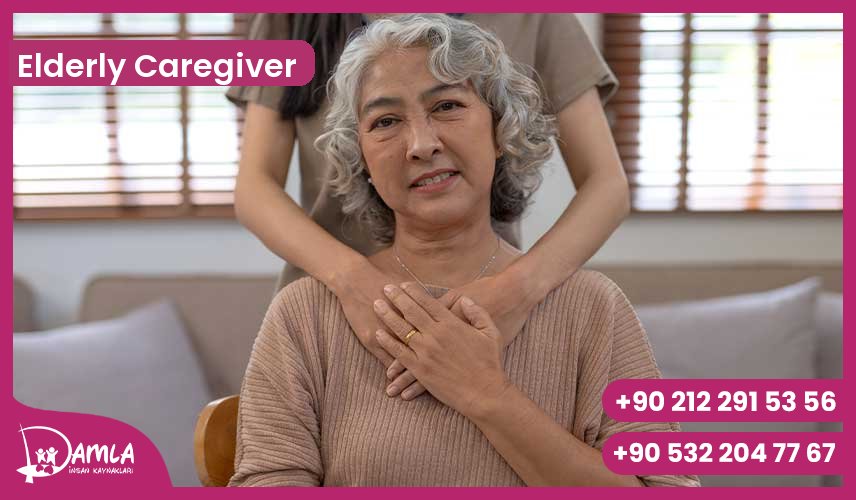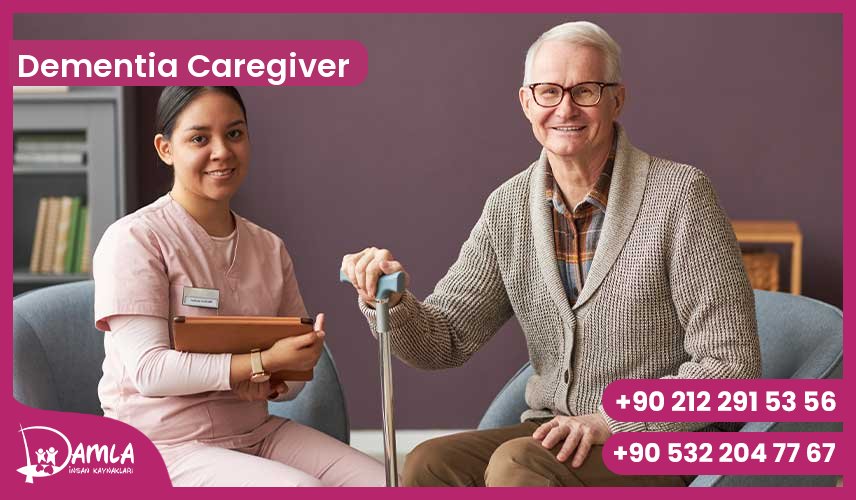Companion

When a loved one has to stay in the hospital or at home for a long time, you may need to arrange for a companion. This is often a preferred alternative when there is no one to stay with the patient and/or elderly individual at night, and when family members cannot always be present by their side.
Damla Consulting introduces you to companions who are physically and mentally capable of providing care to a patient, are referenced, clean, patient, and reliable individuals. If you want your patient to be perfectly cared for in the hospital or home environment, we can introduce you to the candidates from our CV portfolio as soon as possible.
Patient care can become a tiring and morale-depleting process, especially when it needs to be done for a long time. You always want to be by your patient's side, to feed them with your own hands and assist with their care, but your circumstances may not allow for that. On the other hand, individuals who take on this responsibility for a long time may start to wear out both physically and mentally at some point. By sharing this responsibility with a companion whom you can safely entrust your patient to, you can ensure better care for your patient.
If you need a reliable companion to stay with your patient during the day or overnight, we would be happy to connect you with a suitable person as soon as possible.
Individuals providing personal care services in the healthcare sector are referred to as companions or patient companions. Companions can be sought for patients who are hospitalized as well as for home care services.
Who is a Companion?
A companion is someone who helps you care for your loved ones who are hospitalized or bedridden at home and whom you cannot be with continuously or assist. This job can sometimes be performed by a professional caregiver or nurse, and sometimes by anyone seeking this service and looking for work in this field. It is up to you to decide which one you prefer to work with, but you must ensure that the person you agree with to perform this duty is reliable and will do their job with the necessary care and diligence.
What Does a Patient Companion Do?
The job description of a companion varies according to the patient's condition, circumstances, the requests of family members, and the doctor's instructions. This job sometimes involves helping the patient go to the bathroom, ensuring they take their medications on time, and eat their meals. In some cases, it may also include other tasks such as personal hygiene, taking the patient for walks, exercising, massaging, and wound care.
The responsibilities of a companion fundamentally involve assisting with every need that the patient requires. These responsibilities can be listed as follows:
*Ensuring the patient is fed as needed: This may involve feeding the patient, being present while they eat to ensure they do not encounter any issues and that they eat enough, or placing the patient food into the tube leading to their stomach at the right times and in the right amounts.
*Ensuring that the treatment program recommended by the doctor is followed: A good companion knows the treatment program of the patient they are caring for thoroughly and does everything necessary for its implementation. They ensure that the person takes their medications exactly as prescribed, at the right times, and under the recommended conditions.
*Ensuring that the room where the patient is lying is clean, ventilated, neat, and orderly.
*If necessary, they assist the patient with certain exercises and provide massages.
*They take care of the patient's personal hygiene. They pay attention to the cleanliness of their body and clothes. They change the patient's clothes when necessary or assist them in changing, pay attention to oral and dental care, and provide cosmetic care.
*They keep the patient under constant observation, sharing any positive or negative developments they notice with the family and, when necessary, with the doctor.
*They think about and implement activities suitable for the age, gender, abilities, and preferences of the person they are caring for. They provide newspapers or books, read to them if necessary, and ensure they can watch television or play games.
What Qualities Should a Good Companion Have?
*A good patient companion should be gentle, compassionate, patient, and understanding. They should uplift their patient’s spirits and talk about beautiful and encouraging things while conversing with them. They should not get angry if the individual is unable to perform simple actions due to being sick and/or elderly, but should instead provide help and support.
*If some tasks required for the care of the patient require physical strength, you should meet with healthy and energetic candidates.
*The companion should be a clean person. They should assist with the patient's cleanliness and personal care, keep the living area clean, organized, pay attention to the temperature, and ventilate when necessary.
*Providing patient care can sometimes be a tiring and exhausting job. Someone who does not like people and caregiving, and is disturbed by issues, tasks, and images related to patients cannot perform this job properly. Therefore, especially if you think it will be difficult to care for your patient, it is better to agree with a professional companion who will not be disturbed by tasks such as changing diapers, cleaning, or wound care and will perform them adequately.
You should think carefully about your patient’s condition when making this decision. Sometimes a patient may not have many problems other than being weak and exhausted due to their illness. In this case, a gentle, compassionate, and clean person may be sufficient to provide care for them. Many people can assist with taking the patient to the bathroom, helping them change, feeding them, and assisting with walking exercises. However, for heavier, more challenging tasks, it may be necessary to agree with an experienced professional.
*In some cases, the companion may need to be knowledgeable and experienced in first aid.
*Calmness is important, as someone with this quality can assess an unexpected negative situation quickly without panicking and do the right thing.
Professional Companion
One of the most important points to consider when choosing a companion is your patient’s condition. Especially in situations where a challenging, exhausting patient care process is involved, it is more appropriate to prefer professional companion candidates. There may be those among the caregivers or nurses in the hospital where your patient is who are interested in this job.
Experienced Companion
You may prefer to leave your patient, whether it be your mother, father, or another relative in need of care, with an experienced companion in the hospital or at home. Someone who has previously taken on this role already knows what they need to do, which will give you more peace of mind. You should still decide based on your patient’s condition.
Referenced Companion
If you want to make your choice from among referenced companions who have previously performed this job well, please mention this when discussing with the personnel of the Human Resources firm you are in contact with or in your advertisement. When interviewing candidates, inquire about their references in detail and obtain the opinions of one or more individuals they have previously worked with.
What to Consider When Choosing a Companion?
Before posting an advertisement saying “I am looking for a companion” or requesting a firm to find someone for you, make sure to prepare a list of the qualities that the companion candidates you will meet should possess, taking into account your patient’s condition and circumstances. In this list, explain all the tasks related to patient care. Will they be able to go to the bathroom, is a diaper change needed, do they need exercise and massage, how should they be fed; specify all of these. If you make a complete list, you will not waste time with candidates who do not possess the desired qualities. Additionally, any extra tasks that arise later may lead to issues between you.
If you will be requesting other things from the companion besides patient care, please specify these as well.
Question whether the candidate you are interviewing is someone who loves people and approaches them with kindness, is compassionate, patient, positive, energetic, clean - organized, and calm.
If you are looking for a trained companion who has graduated from relevant departments of schools or participated in training programs, request and review the candidates’ diplomas and similar documents.
Finding a Companion with Damla Consulting
You can trust Damla Human Resources firm for your needs such as Filipino caregivers, chauffeur, private driver, nanny, child caregiver, elderly caregiver, play sister, live-in caregiver, shadow teacher, twin baby caregiver, Nepalese caregiver, and caregivers who speak foreign languages, as well as for your need for a patient companion.
With our 20 years of experience, we can provide you with a good companion in a short time. For this, we kindly ask you to contact us and specify the qualities you are looking for. It will not take long for us to find one or more candidates from our portfolio that meet your criteria and request a meeting to introduce you to the candidates.








